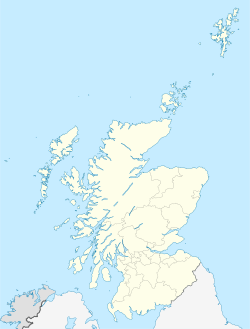History
Scottish involvement in early years of Australian rules in Australia

Scots were playing forms of football during the Victorian gold rush in the 1850s contributing to the early mix of rules played that eventually morphed into Australian rules. [1] Scots living in Melbourne and Victoria in the mid-19th century were greatly involved in the formation of the rules of the game, as well as the formation of a number of early clubs.
The first competition and trophy in 1861 was the instigation of the Royal Caledonian Society and known as the Caledonian Challenge Cup. [2] Among the members was George Frederick Bowen who born in Sydney to Scottish immigrants who founded the Carlton Football Club. [3]
David Watterston of Balgone Barns, Haddingtonshire [4] learned the game upon migrating to Melbourne, but importantly was founder of the Brisbane Football Club which commenced Australian rules football in Queensland in 1866 the second British colony to take up the sport.
One club formed by Scots was the Essendon Football Club (participating in the elite Australian Football League) formed in 1872 [5] which was founded by Robert McCracken, born in Ayrshire who emigrated at the age of 28. [6] The now-defunct Glasgow Redbacks wore black jumpers with a red diagonal stripe across the front, the same as worn by Essendon Football Club said to recognise the Scottish roots of Essendon.
First introduction in Edinburgh: 1880s
As early as April 1888 students at Edinburgh University (mostly Australian) had formed a team. The team contested a match in England against London University on 14 April 1888. [7] Reports in July 1889 from Australia appear to indicate that the sport continued for a time in Edinburgh, but that the Edinburgh team "wiped out every competing team". [8] Records of any team beyond this appear not to have survived.
Rumoured River Clyde competition: 1900s
There are rumours of a competition near the River Clyde during the early 20th Century,[ citation needed ] referred to in Geoffrey Blainey's A Game of Our Own,[ citation needed ] where a number of expatriate Australians were based in Scotland either as Ship Workers or Soldiers. Had this league existed, and there is no proof it ever did, then it had died out around the time of the First World War.[ citation needed ]
Earliest clubs and Establishment of the SARFL: 1990s-Present
During the 1990s the Caledonian Sharks were set up by John Boland, with the travelling restraints at the time club games lessened over the years until a period of inactivity until being adopted and rebranded as the Glasgow Sharks by Andrew Butler in 2003.[ citation needed ] The Edinburgh Puffins and modern SARFL came about through the work of Andrew Butler and Richard Prentice, former players with BARFL side, North London Lions.[ citation needed ] Butler and Prentice began plans for the SARFL in the winter of 2003.[ citation needed ] Intra city friendlies began in early 2003 and a combined rules match against Edinburgh Gaelic side Dunedin Connolleys.[ citation needed ] The Puffins made their debut in the 2003 Northern Cup tournament staged in St Helens.[ citation needed ] The side remained unbeaten against the then St Helens Miners and Wandsworth Demons.[ citation needed ] Later in 2003, the Puffins staged a home and away series against Oxford University winning both hard-fought games.[ citation needed ] The inaugural SARFL season was held in 2004 with a league consisting of two sides in Edinburgh and one in Glasgow.[ citation needed ] The Puffins name, originally conceived by inaugural Edinburgh Puffins coach Gavin England was subsequently conferred upon the Scottish national team. Later in 2010 the Scottish Puffins were rebranded as the Scottish Clansmen.[ citation needed ]
In 2006, Glasgow and Edinburgh considered competing in the BARFL Regional competition, though travel problems saw them continue an expanded SARFL local competition with the Glasgow Redbacks and Middlesbrough Hawks from northern England joining the league. The Hawks left the league in 2007 to join the northern division of Aussie Rules UK, and the Scottish league had difficulty in operating on more than a social match level in 2008.[ citation needed ]
The league was relaunched in 2009, with the Glasgow and Edinburgh playing bases consolidated to one club in each city. They were joined by a new club in Aberdeen, named the "Aberdingoes".[ citation needed ]



























